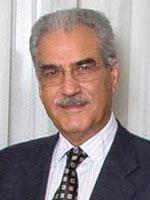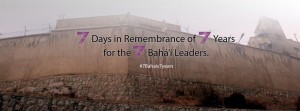This was the third of my quick and furious reactions to the ongoing imprisonment of seven innocent Baha’is in Iran. May of this year marked the end of their seventh year in captivity. As I wrote back then, “I’d never heard of Mr. Khanjani until recently, but today he’s my hero.” He and his six partners in the most benevolent, world-minded sort of “crime” you could imagine were the focus for the international #7Bahais7Years campaign, which was a noble thing but not yet bearing fruit. Now, it’s 7.5 years. Counting…
Here’s one heroic and underreported story of the Quietly Magnificent Seven, prisoners of conscience in Iran.
Mr. Khanjani is 81.
His given name means something like “God’s beauty”.
He was arrested on May 14, 2008, along with five of the Quietly Magnificent Seven. In 2011, his wife of over fifty years, mother of his four children, died. He was not permitted to attend her funeral.
He is held in Gohardasht Prison. (The place even sounds harsh to a Western ear. Tehran’s Evin Prison is more infamous, but Gohardasht is brutally harsh as well.) He lives.
While his story will echo for a long age among Baha’is – among all who pay attention to grace under pressure, to indomitability under the worst circumstances – surely his days are numbered, yet when I read a brief biography, the man does seem to be pretty much unbreakable.
Listen: after the 1979 Revolution, Iran’s Baha’is were still under the leadership of their annually elected National Spiritual Assembly, nine women and men who never asked to be leaders, never campaigned, but were chosen from among the mass of Iran’s largest religious minority to care for and administer the community. It wasn’t long before their death sentences were handed down, the crime being heresy (or espionage, or immorality, or sedition, or any number of euphemisms for cut the head off the snake and the body will follow). All nine were executed.
And for those of you who think of Baha’is as “nice”, fairly harmless idealists, let me tell you this story. It is astounding. (In my experience, the Baha’is really are unbelievably pleasant people, but they can also be stubborn and resolute and friggin’ FIERCE in holding to their convictions about the path to peace and justice, which is a fiercely non-violent one.) When the Baha’i community of Iran found itself without the members of their National Assembly – murdered, all, for the crime of being leading members of the Baha’i community – they practised a depth of democracy that must be unsurpassed in all of history: they held a bi-election. Their institutions had not yet been formally outlawed. So there were, yes, vacancies to be filled. They filled them. By secret ballot, without nominations, in an atmosphere of quiet reflection, the community did what Baha’i communities everywhere do. Nine new believers were elected, but their mandate was a tad unusual.
All nine, before long, were arrested on trumped up charges and executed.
So the Baha’is held another bi-election. This is one of the more astonishing episodes of the 20th century, though hardly anybody knows about it. Jamaloddin Khanjani, a prominent businessman whose factory had been closed, throwing hundreds out of work, and his assets seized by the new Islamic Republican government, was among those elected. Can you imagine? And perhaps because of mounting international pressure to stop the attempted elimination of the Baha’i community, or maybe some sense of inherent Iranian decency, or because you can’t kill a Khanjani, he survived repeated jailings. Four of his National Assembly colleagues were executed, however, but he was among those who lived to bear the constant harassment of himself and many of his family members, not to mention the attacks that every attempt at starting new businesses suffered. The man sailed right along. He kept doing what he did. He served.
And now he’s among the Seven, the Yaran, that group of “friends” who, once the Baha’i administrative structures had been definitively banned, tried informally to serve the needs of their oppressed community. This is the third of the 7 to be remembered by an international campaign for justice and freedom, the third Friend that this writer has come, dimly, to know.
You can’t kill Jamaloddin Khanjani. He’s in me, now. Note to the Islamic Republic: you can’t destroy a community like this. And you won’t.



I love these people!